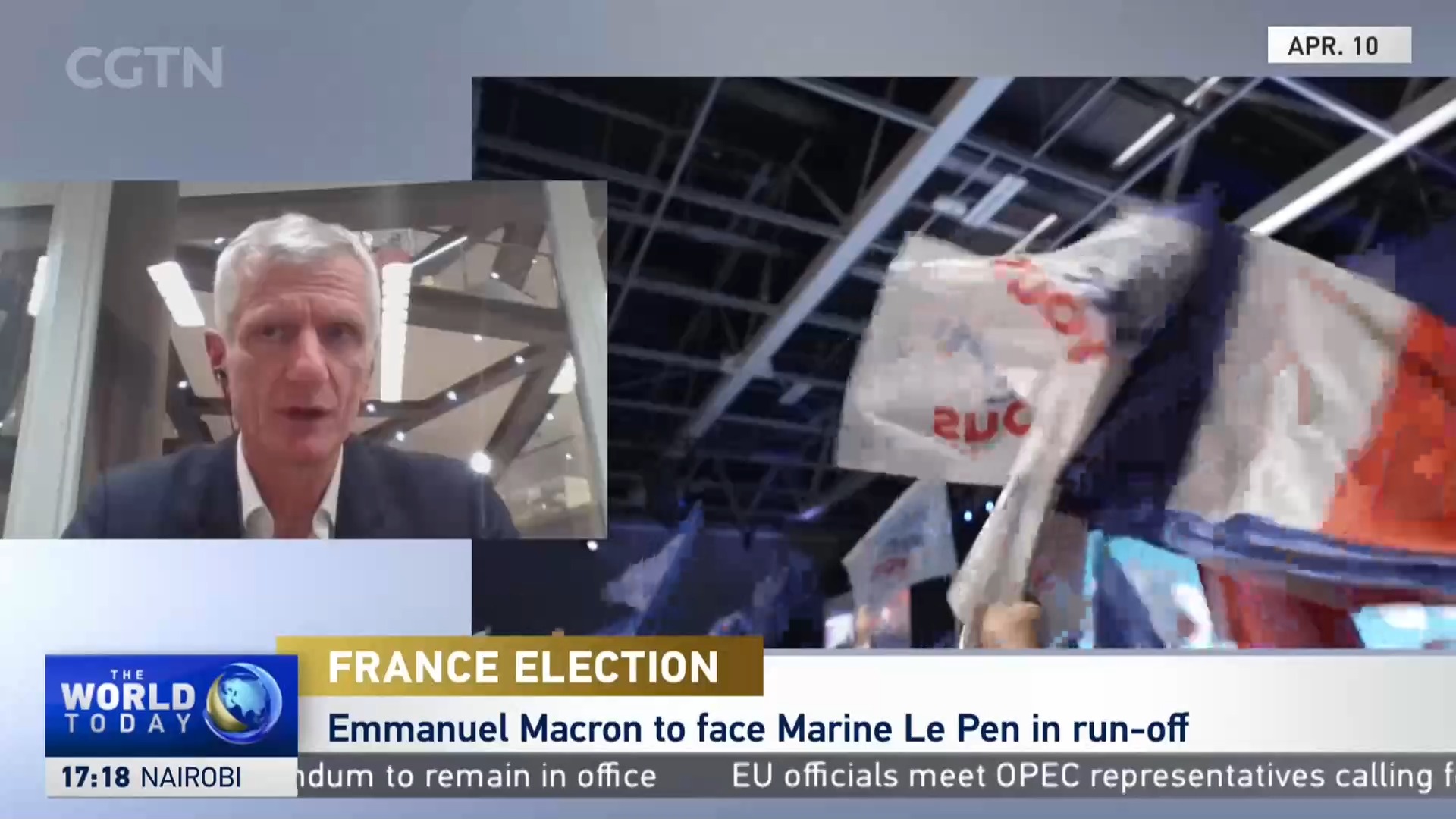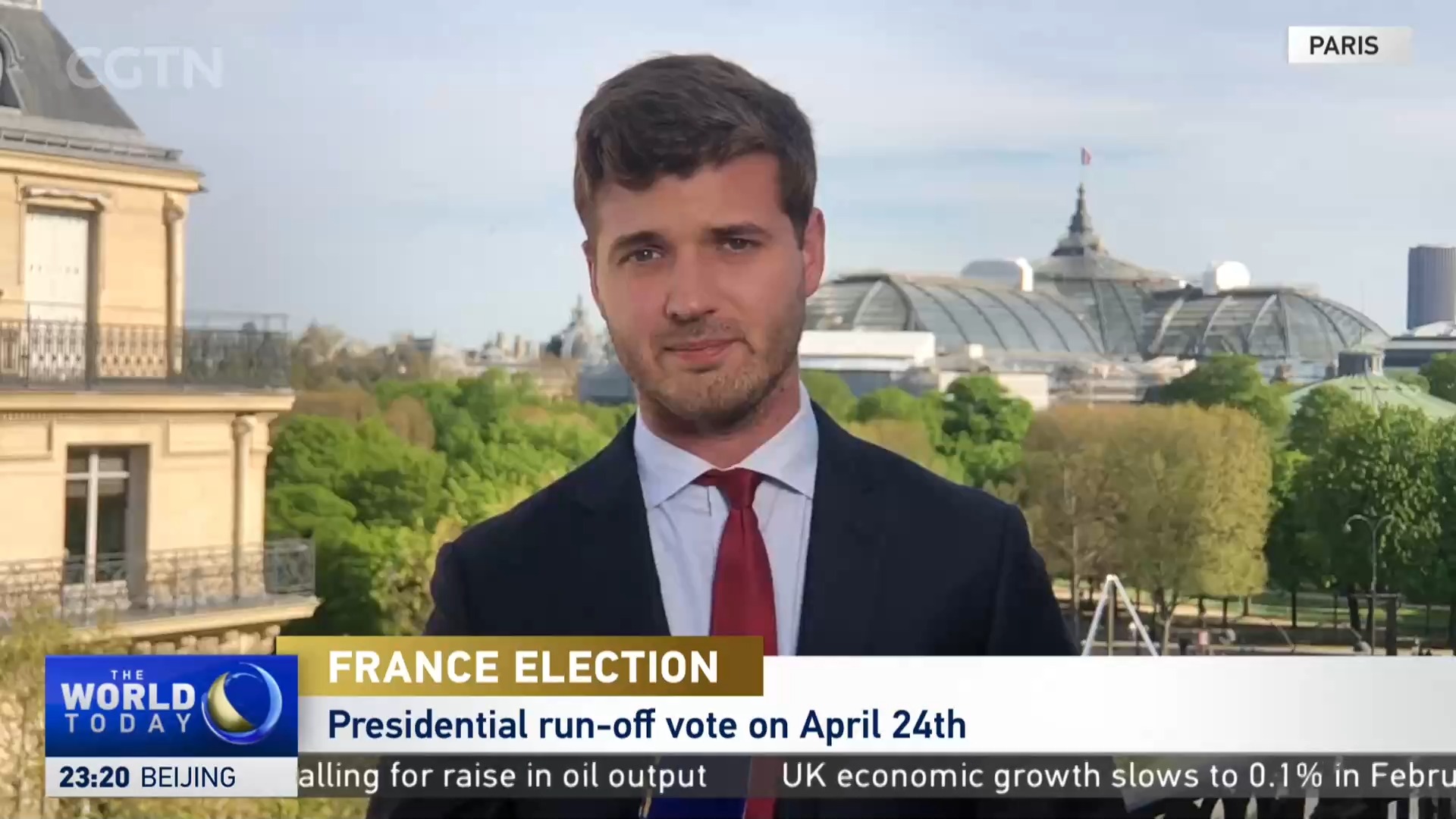
French President Emmanuel Macron reacts after partial results in the first round of the 2022 French presidential election. /Benoit Tessier/AFP
French President Emmanuel Macron reacts after partial results in the first round of the 2022 French presidential election. /Benoit Tessier/AFP
French President Emmanuel Macron and challenger Marine Le Pen have qualified for what is expected to be a very tight presidential election runoff on April 24.
Here's what you need to know about the first results from Sunday, how the next round of voting will work, the big differences between the candidates, and which of them is most likely to become president.
READ MORE
Smart facemask technology
The landfill waste coming back to haunt us
Michael Wood: telling China's story
05:26

1. Macron leads in first-round exit polls

With 97 percent of exit polls counted, centrist candidate and current leader Macron was narrowly ahead of National Rally's Le Pen, taking 27.6 percent of the vote compared to his rival's 23.41 percent.
Left-wing contestant Jean-Luc Melenchon saw an improvement on his last presidential run in 2017 and was projected to come third with nearly 22 percent, missing out on a place in the final contest by just 2 percent. His supporters blamed voters for giving their ballot to candidates from other lower-polling left-wing parties, including the Greens and the Socialists.
Twelve candidates were in the running, but Macron, Le Pen and Melenchon were the only three who polled more than 10 percent. Far-right firebrand Eric Zemmour took fourth place with an estimated 7 percent.
A key event of the night was support collapsing for the traditional right- and left-wing parties that used to run France: the Republicans' Valerie Pecresse came in fifth with around 5 percent, while the Socialists' Anne Hidalgo came 10th with a record-breaking low for the party at 2 percent.
2. How the second round works

Exit polls and policy platforms for last remaining candidates in the French presidential elections. /Sophie Ramis, Paz Pizarro, Kenen Augeard/ AFP
Exit polls and policy platforms for last remaining candidates in the French presidential elections. /Sophie Ramis, Paz Pizarro, Kenen Augeard/ AFP
The French elections are held in two rounds, 14 days apart. In the first round, which took place on Sunday, voters had the chance to chose from a wide array of candidates and much more diverse range of political programs.
Now, with Macron and Le Pen having received the most votes in the first round, voters will only be able to choose between these candidates and their political agendas in a final vote on April 24. The winner of that contest will formally take power on May 13.
04:04

3. Who's most likely to win in round two?

Opinion polls for second round of elections. /Muriel Pichon-De-Boysere, Samuel Barbosa, Kenen Augeard/AFP
Opinion polls for second round of elections. /Muriel Pichon-De-Boysere, Samuel Barbosa, Kenen Augeard/AFP
Polls predict a close-fought second round with one survey projecting Macron will win with just 51 percent of the vote and 49 percent for Le Pen. In fact, the gap is so tight that both candidates are within the margin of error to win.
Other pollsters gave Macron a better chance, with up to 54 percent – but that's still much narrower than in 2017, when Macron beat Le Pen with 66.1 percent of the votes.
In past elections, left- and right-wing voters have historically come together to block the far right from power, known as a front republicain. The center-left candidates, including those of the Republicans and the Socialists, have endorsed Macron for the run-off, but it is not clear if their voters will follow.
However, their votes collectively add to up to less than 7 percent of the electorate, with left-wing voters set to be crucial to determining the election's outcome. While Melenchon urged voters not to back Le Pen in the second round, he stopped short of endorsing the current president.
Zemmour and nationalist Nicolas Dupont-Aignan were the only contestants to throw support behind Le Pen, directing their voters to back the remaining far-right candidate in the run-off.

Macron and Le Pen will face off in a televised debate on Wednesday. /Eric Feferberg/Pool/AFP
Macron and Le Pen will face off in a televised debate on Wednesday. /Eric Feferberg/Pool/AFP
4. Key policy differences
The run off between Macron and Le Pen in just under two weeks' time is being billed as a repeat of the 2017 duel between pro-European economic liberalism and eurosceptic nationalism.
Macron has taken aim at his far-right contender over the financing of her populist economic agenda that pledges to return the retirement age to 60 for those who start work before 20, scrap income tax for the under-30s and reduce VAT on energy from 20 to 5.5 percent.
In power since 2017 after pledging to radically reform the country's economy, Macron has lowered taxes and unemployment levels. However, his tenure has been marked by the anti-government gilet jaunes protests and a failure to push through his controversial flagship pension reforms.
In recent months, France's dramatic decline in real wage growth has hit lower-income households particularly hard, with Le Pen attempting to capitalize on the fact that just over 20 percent of people in France view Macron's track record on purchasing power positively.

Marine Le Pen appears on stage after partial results in the first round of the 2022 French presidential election are announced. /Pascal Rossignol/Reuters
Marine Le Pen appears on stage after partial results in the first round of the 2022 French presidential election are announced. /Pascal Rossignol/Reuters
She has also managed to detoxify her far-right image, bringing her party closer to the mainstream at a time France has also lurched to the right in the wake of Islamist attacks. Le Pen has also toned down her calls for France to leave the EU, with one survey showing that fewer than half of all French now found her "scary". Even so, her less combative approach remains underlined by a hardline anti-immigrant program.
That includes a referendum on anti-immigration measures, the expulsion of foreign offenders, a ban on legalizing the status of undocumented migrants, and the end of family reunification.
Macron's main policies are centered on liberal economic reforms, including pushing back the retirement age to 65, around 15 billion euros in tax cuts, "full employment" in five years' time, and a crackdown on France's welfare system. He's also vowed to build six new-generation nuclear reactors.
READ MORE: Clean energy: Why is nuclear a dirty word?
5. Where are Macron and Le Pen concentrating their campaigns?
While Macron was initially expected an easy win in this election, riding high in polls thanks to a fragmented opposition and his statesman's role in the Ukraine crisis, it is now thought he won't be able to count on French voters' traditional anti-far right front in the final runoff and will need to step up his campaign.
Le Pen has for months been touring towns and villages across France, focusing on cost-of-living issues troubling millions and tapping into anger toward rulers. Macron, in contrast, started late on the trail, spending much of the run-up to the first round on addressing the Ukraine conflict (in terms of handling crises, he is viewed in polls as trustworthy).

Macron and Le Pen are both looking to woo France's traditional left wing. /Sophie Ramis, Kenan Augeard/AFP
Macron and Le Pen are both looking to woo France's traditional left wing. /Sophie Ramis, Kenan Augeard/AFP
Macron supporters say the incumbent leader will have to spend more time campaigning on the ground than he did ahead of the first round. Campaign insiders said he must now especially focus on wooing the left, with the way left-wing votes are redistributed nationally set to be a key factor in the second round.
Finance Minister Bruno Le Maire said themes often associated with the political left, such as the fight against climate change and the strengthening of the European Union, would play a key role in the next two weeks of campaigning.
On Monday Macron took his campaign to the industrial heartlands of the northern Hauts-de-France region, a blue-collar stronghold of Le Pen, who is polling at around 42 percent in towns. She is expected to continue softening her image to bring over right-of-center voters, with an important television debate between the two candidates set for April 20.
6. In quotes: Reactions to Sunday's results
Macron on his manifesto: "Do you want a France that speaks of full employment and is serious about financing its welfare state, its pensioners, its schools, hospitals and public services?"
Le Pen on the choice French voters have between two opposite visions of France: "one of division, injustice and disorder imposed by Emmanuel Macron for the benefit of a few, the other a rallying together of French people around social justice and protection. I intend, without delay, to sew back up the tears that a ripped-apart France suffers from."
Melenchon on the second round: "We know for whom we will never vote. You must not give a voice to Madame Le Pen. I know your anger but do not give yourselves over to errors that will be difficult to repair."

Jean-Luc Melenchon looks on before casting his ballot in the first round of elections. /Denis Balibouse/Reuters
Jean-Luc Melenchon looks on before casting his ballot in the first round of elections. /Denis Balibouse/Reuters
The Republicans' Pecresse on France's future: "I am deeply concerned for the future of our country, when the far right has never been so close to winning. Emmanuel Macron has played with fire and put France at great risk. Marine Le Pen's plan would lead the country into discord, impotence and bankruptcy."
Far-right candidate Zemmour on second round: "(Against Le Pen) is a man who... didn't say a word about identity, security, immigration during his campaign and who will therefore do worse again if re-elected. That is why I call on my voters to vote for Marine Le Pen."
Defeated Socialist candidate Hidalgo on second round: "So that France does not fall into the hatred of all against all, I solemnly call on you to vote on April 24 against the far-right of Marine Le Pen."
Source(s): Reuters
,AFP

